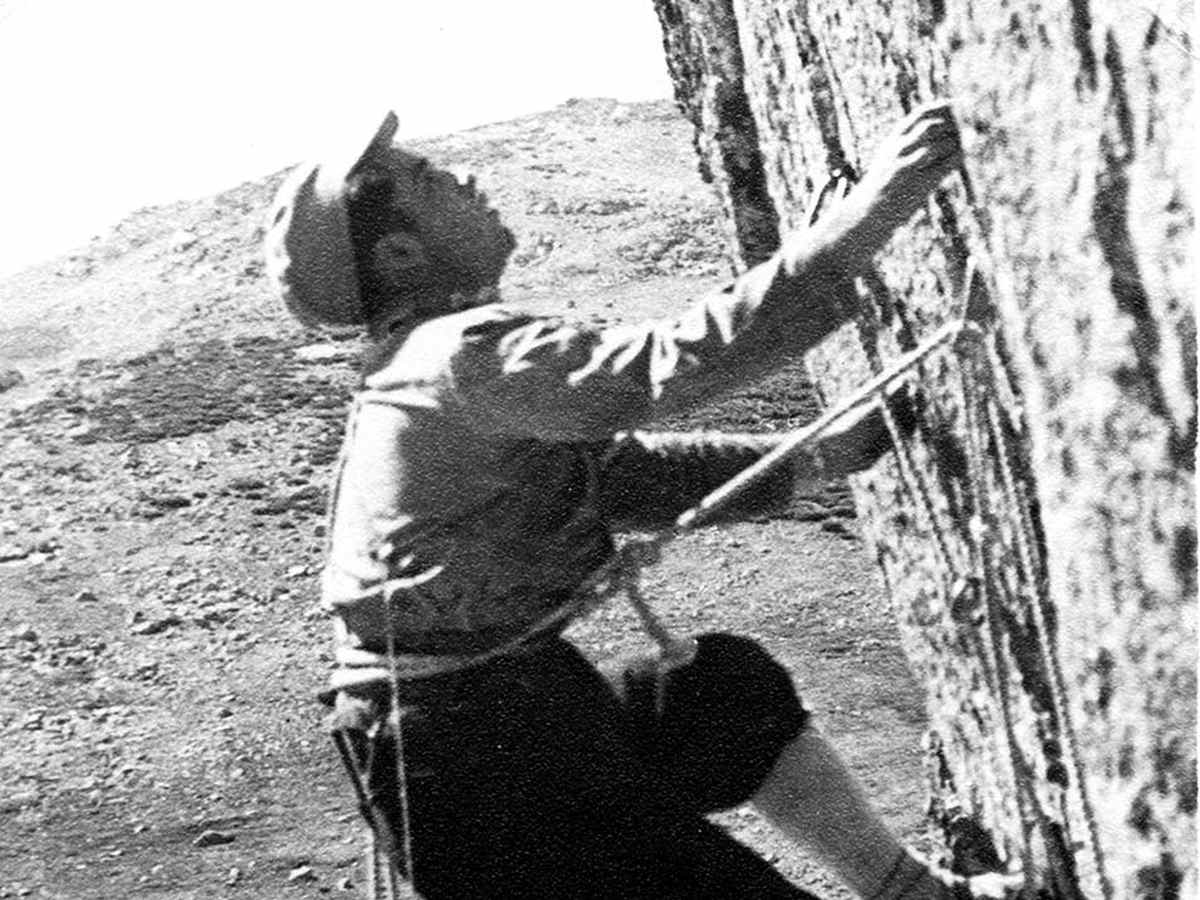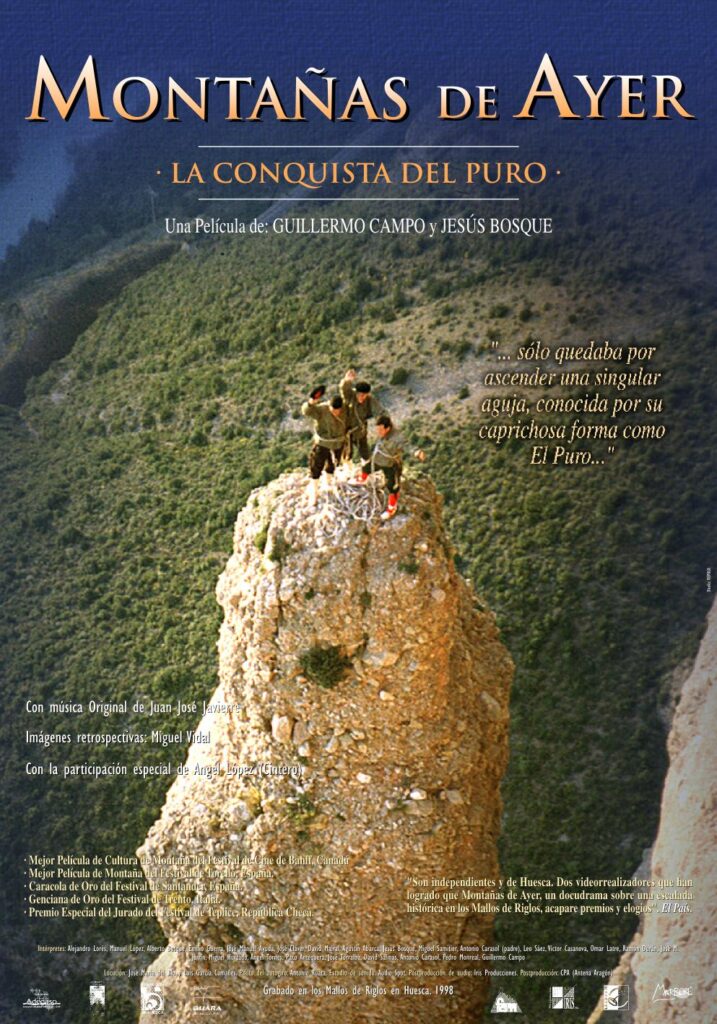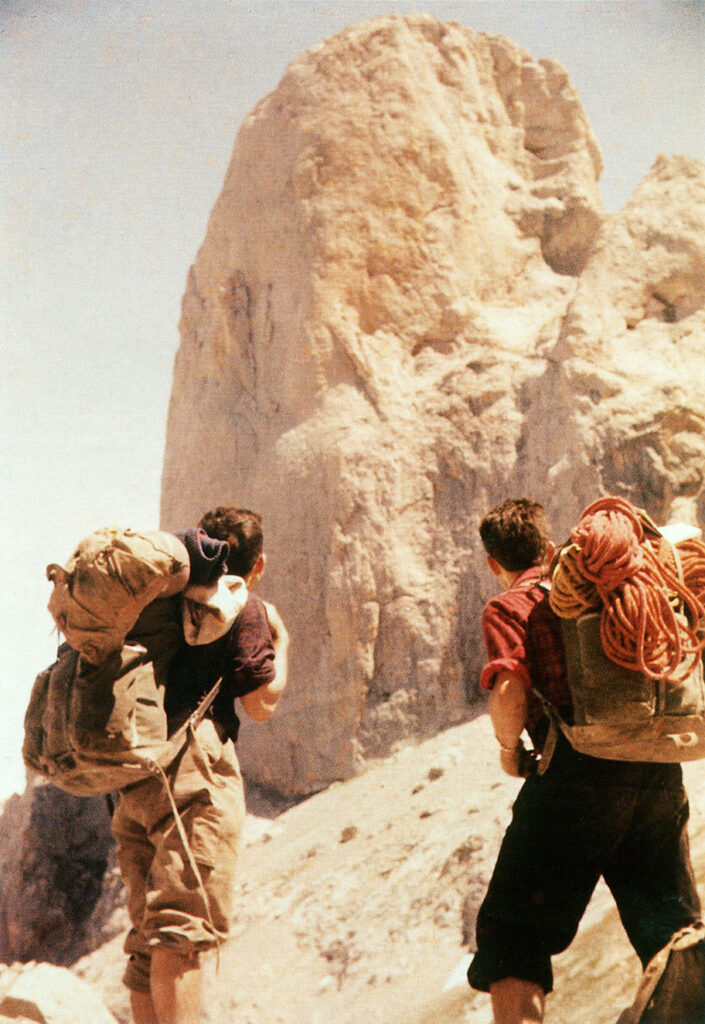Ángel López "Cintero", honorary award at the Pyrenees Mountain Film Festival

THE ARAGONESE CLIMBER IS AN ICON OF MOUNTAINEERING AND THE LONGEST ACTIVE CLIMBER IN THE WORLD TODAY.
THE OLIMPIA THEATRE WILL HOST THE TRIBUTE CEREMONY ON THURSDAY 22 FEBRUARY AND THE SCREENING OF THE MULTI-AWARD WINNING FILM "YESTERDAY'S MOUNTAINS".
THE EXHIBITION "THE PRODIGIOUS DECADE 1953-1963 OF ARAGONESE MOUNTAINEERING" WILL COMPLETE THE TRIBUTE TO HIS FIGURE AND TO A WHOLE GENERATION.
The climber Ángel López from Zaragoza will receive the honorary award of the Pyrenees Mountain Film Festival 2024; a recognition that highlights the figure of people and institutions with an important work linked to the mountain and the natural environment.
Popularly known as "el Cintero", this pioneer of Aragonese mountaineering and also the oldest active climber in Spain will be in the capital of Huesca on 22 February.
The award ceremony will take place at the Olimpia Theatre (20:30h) and the multi-award winning film "Yesterday's Mountains" will be screened at the same time. This film focuses on "the prodigious decade", an era of which López is one of its emblems; this film production won several awards such as the best film on mountain culture in Banff.
On the same day, the exhibition "LA DECADA PRODIGIOSA 1953-1963 del Alpinismo Aragonés" (THE PRODIGIOUS DECADE 1953-1963 of Aragonese mountaineering) will be inaugurated, made up of unpublished and original materials from this generation that first climbed the west face of Mallo Pisón in Riglos.
The Pyrenees Mountain Film Festival will award its honorary prize to the Aragonese climber Ángel López, popularly known as "el Cintero". A recognition that highlights his career linked to the mountains and nature, being one of the pioneering climbers in Aragon and a member of the so-called "prodigious decade".
The Zaragozan will attend the festival to collect the award on Thursday 22 February at the Teatro Olimpia (20:30h). "He is an icon, a national reference, an example of dedication, devotion and passion for the mountains throughout his life. His person perfectly represents the spirit and meaning of this award" declares David Asensio, director of the Pyrenees Mountain, Adventure and Nature Film Festival.
A brief review of Ángel López
Ángel López was born in Zaragoza in 1936 and when he was only ten years old he joined the Montolar centuria of the Frente de Juventudes, the only means of climbing in the mountains at that time. After learning the techniques and meeting his fellow climbers: Alberto Rabadá, Manuel Bescós and Rafael Montaner among others; together with the first two and at only 17 years of age, López made his first repeat of the Peña Sola de Agüero. Three months later and with the same team, he achieved the first ascent of the Puro de Riglos, one day ahead of the Catalan Jordi Panyella's team; with this milestone he marked the history of mountaineering in Spain, a 1953 that marked the beginning of the so-called "Prodigious Decade" of Aragonese mountaineering.
Among his achievements during this decade were openings in places such as the Mallos de Riglos, the Peña del Moro in Mezalocha, Ricla and the Foz de Salinas, as well as the first repetitions of the Espolón Clos, the Brecha de Roldán, the Puro de Vadiello and the Huevo de San Cosme. In 1957, together with Alberto Rabadá, Rafael Montaner and Juan José Díaz, he achieved another of his most remarkable ascents, the first direct route to the west face of the Mallo Pisón in Riglos by the route they christened Serón-Millán.
His achievements in sport and institutional recognition include the Gold Medal of the Aragon Mountaineers and the Aragon Government's Master's Award for Lifetime Sport. He is an honorary member of the Spanish High Mountain Group and a member of the Pyrenean High Mountain Group of France.
A screening and an exhibition will complete the tribute.
The day of 22 February will be rounded off with the screening of a feature film and the opening of an exhibition on this generation. The film Montañas de ayer (Yesterday's Mountains) will be the culmination of the event, which will start at 20:30 at the Teatro Olimpia in the capital of Huesca. A documentary with touches of fiction directed by Guillermo Campo and Jesús Bosque in 1998, the film focuses on the conquest during the 1930s-40s of "El Puro" in Riglos, the last of the needles to be completed at that time. Numerous national and international awards endorse its quality and beauty, among them the Best Mountain Culture Film in Banff (Canada), the Golden Gentian in Trento (Italy) or the Special Jury Prize in Teplice Nad Metuji (Czech Republic).

On the same day, the exhibition "LA DECADA PRODIGIOSA 1953-1963 del Alpinismo Aragonés" will open its doors, an exhaustive review curated by Jesús Bosque himself with audiovisuals, photographs and original and unpublished materials of the aforementioned "Prodigious Decade"; a period of ten years in which national climbing set its sights on what was done in Aragon and especially on the routes inaugurated by Rabadá and Navarro. A set of themed materials that will delve into the exploits of the group formed by Pepe Díaz, Manuel Bescós, José Antonio Bescós, Rafael Montaner, Julián Vicente "Nanín" and Ángel López "Cintero" himself. Until 23 March, the Ibercaja Centre - Palacio de Villahermosa will host the legacy of the conquests of these pioneers, such as the conquest of the west face of the Naranjo de Bulnes or the north face of the Eiger.

This full programme of events rounds off the award for Ángel López, the second name on the PMFF list after the Mountain Rescue and Intervention Groups of the Guardia Civil of Huesca and the Helicopter Service of the Guardia Civil honoured last year.
The Pirineos Mountain Film Festival is organised by the Fundación Festival Internacional de Cine de Huesca with the support of the Diputación Provincial de Huesca, Ayuntamiento de Huesca, Gobierno de Aragón, TuHuesca, Aramón, Fundación Deporte Joven del Consejo Superior de Deportes, Instituto Aragonés de la Mujer, Fundación Ibercaja, Turismo de Aragón and Peña Guara as organiser of the sports activities in Huesca.
Fastpacking is not about going faster. It's about going lighter.
If you come from classic trekking, this is the next step: learning to move with less weight,
more fluid and enjoying every kilometre more.
Join the Outsiders Newsletter and start discovering what lightness feels like.
